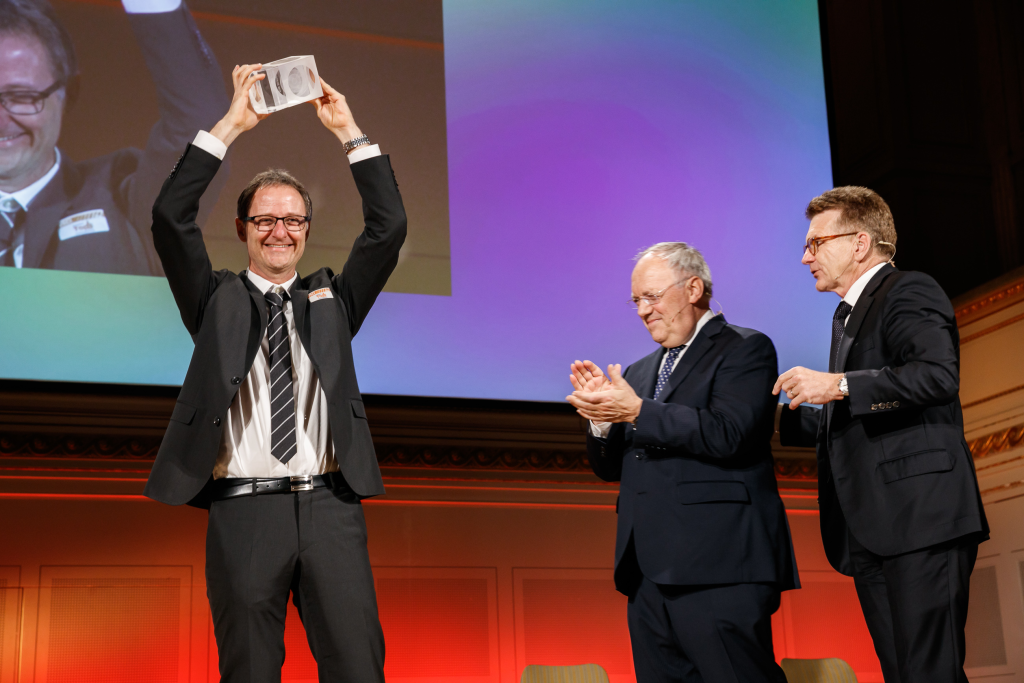Creativity for VET
Bern, 14 March 2017 – Digitalisation and Industry 4.0 require creativity in all professional fields. But how can one encourage creativity in VET? Is creativity something that can be learnt? Prominent national and international figures in research, business and politics were gathered today at the CREATIVET symposium in Bern to answer these questions. The event also commemorated the tenth anniversary of the Swiss Federal Institute for Vocational Education and Training SFIVET. Federal Councillor Johann N. Schneider-Ammann conferred this year’s ENTERPRIZE award.
“If Europe wishes to maintain its innovative capacity, it needs to help young people undergoing training to develop their creative potential.” This is the conclusion drawn by Danish creativity researcher Lene Tanggaard Pedersen. In order to nourish and tap the creative potential of the next generation of skilled workers, enthusiasm and a desire to experiment need to be instilled in training.
Prominent national and international figures in research, business and politics spoke to an audience of some 600 participants at the Kultur Casino in Bern. They underscored the importance of creativity in training and working life. Mr Valentin Vogt, President of the Swiss Employer’s Association (SAV), referred to the Swiss VPET system as an extremely successful public-private partnership. Federal Councillor Johann N. Schneider-Ammann, the head of the Federal Department of Economic Affairs, Education and Research EAER also stated with confidence: “If our skilled workers learn early on how to be creative and take initiative, then Switzerland will be able to retain its top position in innovation ranking lists.”
Switzerland’s VPET system sets standards worldwide, explained Shyamal Majumdar, Head of the UNESCO-UNEVOC International Centre for Technical and Vocational Education and Training. In his speech, Prof. Friedrich Hubert Esser, President of the German Federal Institute for Vocational Education and Training (BIBB) stressed the importance of dual-track VET for a successful economic system.
This year, the ENTERPRIZE was awarded for the first time by the Swiss Venture Club (SVC) and SFIVET, under the patronage of Federal Councillor Johann N. Schneider Ammann and the Swiss Employer’s Assocation (SAV). The award exemplifies what it means to put innovative and creative ideas in practice and transform them into marketable products and services. “Through their innovation training projects, the finalists are an expression of Switzerland’s modern VPET system. They break away from traditional learning and demonstrate the kind of creativity that our country needs,” stated SVC President Hans-Ulrich Müller. The Swiss Vehicle Chassis Association (SVCI) was chosen as the winner of the ENTERPRIZE 2017 award.
With the national symposium in Bern, SFIVET also commemorated its tenth anniversary. SFIVET took this opportunity to look ahead. “As Swiss university we are the trusted partner for all matters relating to vocational education and training today and in the future”, stated SFIVET Director General, Prof. Dr. Cornelia Oertle, summing up SFIVET’s vision. SFIVET seeks to obtain accreditation as a higher education institution by 2022, which should consolidate its position and further benefit the VPET system. Dr Philippe Gnaegi, Chairman of the SFIVET Board, spoke about the newly created Swiss Observatory for Vocational Education and Training OBS SFIVET, which is responsible for anticipating VET-related trends in order to propose solutions for practitioners.
The symposium in Bern also served as the opening for SFIVET’s 5th International VET Congress, where researchers presented the latest research findings on creativity in VET in their respective fields. This event ended on 16 March 2017.
Contact for enquiries:
Jacques Andres, Head of Communication at SFIVET, 058 458 27 12, jacques.andres@sfivet.swiss
